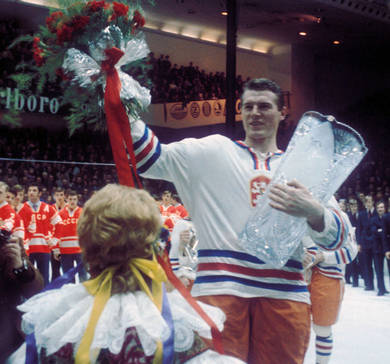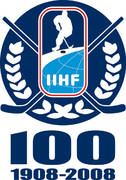Story #5
April 20, 1972 – Prague, Czechoslovakia
The 1972 international hockey season culminated with an historic double: for the first time, both an Olympics and World Championship would be held in the same year. From 1920 to 1968, the IIHF had always considered the Olympics to represent both events, but this year it decided to try making the World Championship a tournament independent of the Olympics. It proved to be a monumental event.
After Canada’s Trail Smoke Eaters defeated the Soviet Union 5-1 to win the 1961 World Championship gold, the Soviets went on a decade-long run of success during which time they seemed utterly invincible. They won nine straight events (Olympics and World Championships) starting in 1963 (Sweden won the 1962 World Championship in Colorado in which the Soviets didn’t participate), including the 1972 Olympics. But a few weeks later, at the World Championship, a different story emerged.
During this lengthy streak of success for the Soviets, only three other nations won a medal of any colour – Czechoslovakia, Canada, and Sweden. But Canada had not played internationally since 1970, so it was reasonable to assume only the Czechoslovaks and Swedes would have any sort of chance to beat the Soviets at the ’72 World Championship in April in Prague. Indeed, given the political tensions between the two Iron Curtain countries, the most telling games would be those between the Czechoslovaks and Soviets.
The tournament format was a difficult one. The six teams played a double round robin, so for weaker countries it was a matter of survival, and for the stronger countries there were plenty of chances to make mistakes and much pressure not to many any. In a ten-game tournament, the weak teams fall by the wayside quickly, but the top teams are more vulnerable.
After the first half of the tournament, both the Soviets and Czechoslovaks had four wins and a tie. Not surprisingly, the tie was a 3-3 score between each other. Sweden and Finland played mediocre hockey, and West Germany and Switzerland were the two weak nations in survival mode. Both top teams won their next three games, setting up a showdown on April 20, 1972, that would surely decided gold (although they had one game remaining after this).
The two teams were evenly matched, but the Soviets were just a little better at every position, and with their constant success there seemed little chance the Czechoslovaks could get in the way of another victory. They had the great Vladimir Dzurilla in goal, but the Soviets had Tretiak. The Czechoslovaks had Vaclav Nedomansky, Ivan Hlinka, and Jaroslav Holik, superstars all. But CCCP had Valeri Kharlamov, Boris Mikhailov, and Alexander Yakushev, even more successful scoring stars.
Jaroslav Holik was the big hero. After creating a turn-over that led to the Soviets’ first goal, Holik scored the eventual winner, making it 3-1 after two. Holik’s goal remains maybe the most famous marker in the history of Czechoslovakian hockey. The CSSR eventually won 3-2, sending fans in Prague’s Sportovni hala and an entire nation into a frenzy. The Soviet winning streak was over, and it was ended by their political adversaries in Czechoslovakia. The sporting win was great; the cultural importance of the win even greater.
Although the hosts had won the game, they had not yet won gold. Both teams still had one more game to play, and the Soviets still had an outside chance to claim first place. They failed, however. Sweden held them to a 3-3 tie and Czechoslovakia hammered Finland 8-2 to put an exclamation mark on the win. Although the Soviets won the next three World Championships and the 1976 Olympics, this win in Prague before home fans lusting after a defeat of the Soviet hockey empire remains one of the greatest and most emotional victories in international hockey history.
As part of the IIHF's 100th anniversary celebrations, www.IIHF.com is featuring the 100 top international hockey stories from the past century (1908-2008). Starting now and continuing through the 2008 IIHF World Championships in Canada, we will bring you approximately three stories a week counting down from Number 100 to Number 11.
The Final Top 10 Countdown will be one of the highlights of the IIHF's Centennial Gala Evening in Quebec City on May 17, the day prior to the Gold Medal Game of the 2008 World Championship.
These are the criteria for inclusion on this list: First, the story has to have had a considerable influence on international hockey. Second, it has to have had either a major immediate impact or a long-lasting significance on the game. Third, although it doesn't necessarily have to be about top players, the story does have to pertain to the highest level of play, notably Olympics, World Championships, and the like. The story can be about a single moment — a goal, a great save, a referee's call — or about an historic event of longer duration — a game, series, tournament, or rule change.
|
 |
Click here for the 100 Top Stories
|










